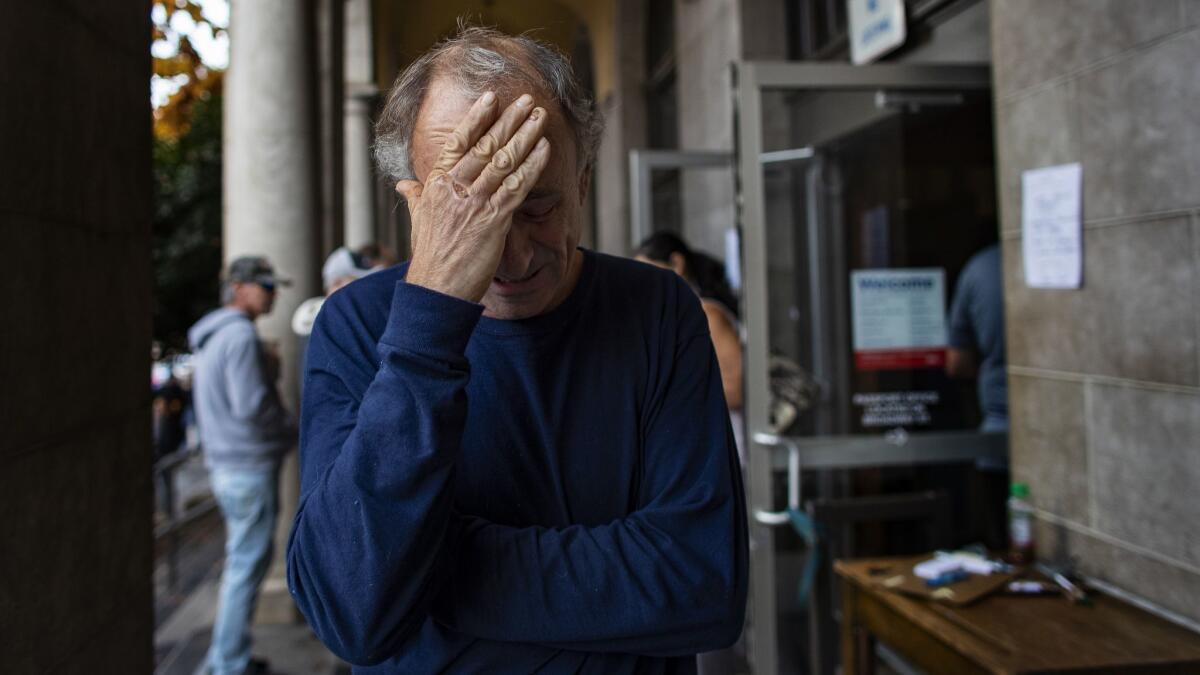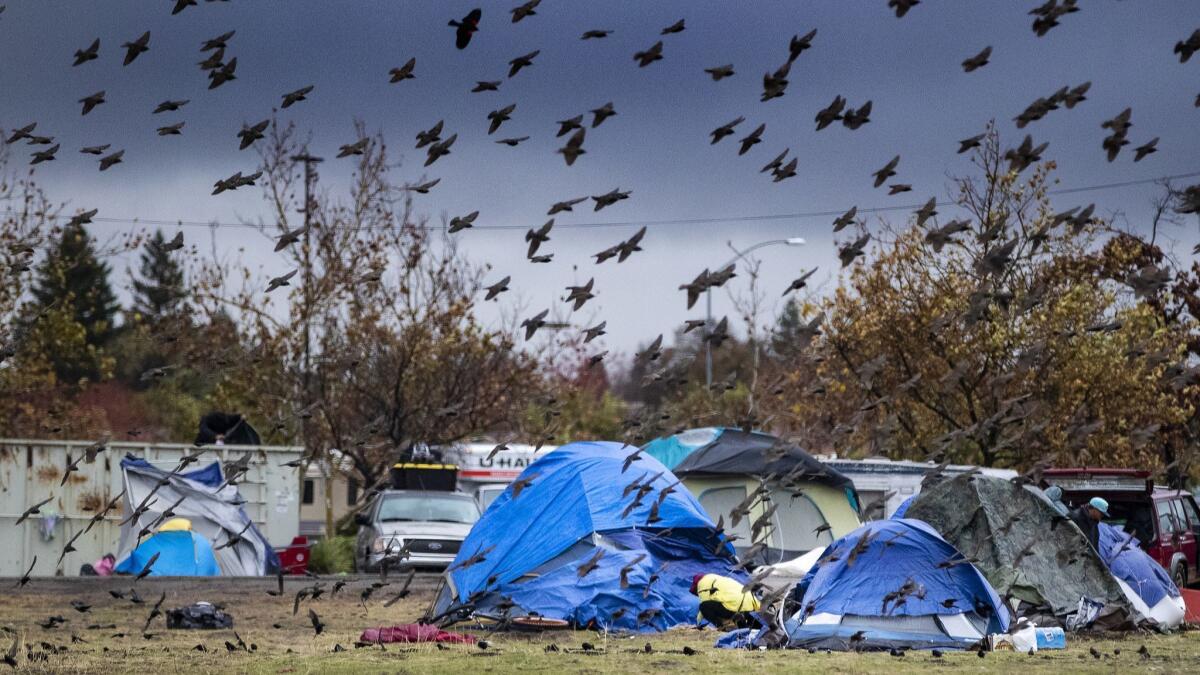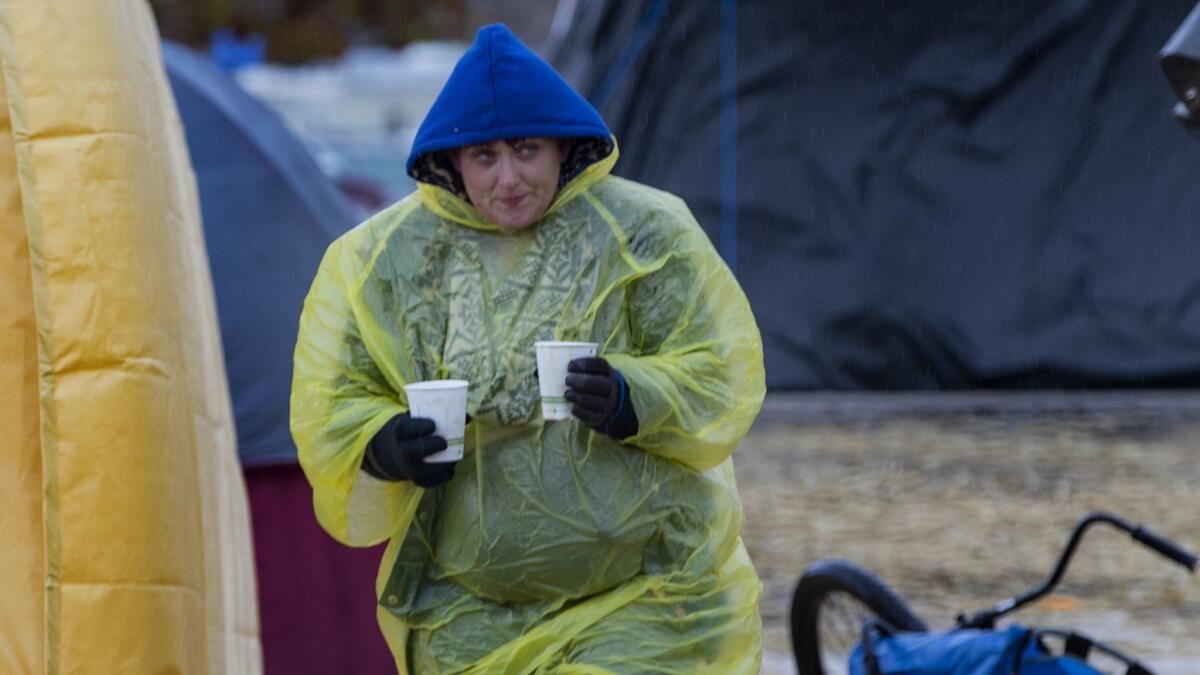For thousands of displaced Paradise residents, recovery is a whole new challenge

- Share via
Reporting from PARADISE, Calif. — Toward the end of a recent news conference held to update the public on the recovery effort in Paradise, a man rose from the audience with a question.
He understood that making the burn area safe for people to return to would be difficult. Especially with the near-constant threat of debris flows. But when could he go back?
“Two months? Three months? Six months? I have to know what to do,” he said, his voice quavering with emotion. “Where do I go from here?”
Across Butte County, about 50,000 people have been displaced from Paradise and the nearby towns of Concow and Magalia. Some of them barely escaped and have been so shaken by the wildfire that they’ve said they have no intention of returning.
Others are content to set their lives by law enforcement’s timetable — authorities have said that eastern and southern portions of Paradise might be opened to residents early next week, if the weather allows. Parts of Concow, Old Magalia and Yankee Hill could follow later in the week. After an initial 24-hour period for residents, those areas will then be open to the public.
Authorities are also hearing from a third group: evacuees who are desperate to visit their properties, but who live in parts of Paradise that will likely remain off-limits for several more weeks.
“I know that we’re receiving lots of calls from very frustrated people,” Butte County Sheriff Kory Honea said at a news conference earlier this week. “I would ask that you please understand this process and bear with us. We want to get you home as quickly as we possibly can.”
Although the Camp Fire has been fully contained, the ash-coated landscape it left behind remains full of hazards. Dozens of trees burned and weakened by the fire have to come down. Fried power lines have to be cleared and replaced. Tons of potentially toxic debris must be carted off.

Authorities have said that the town and its 18,000 homes and businesses destroyed by the fire are essentially one massive worksite and that residents can’t return until utility companies like Pacific Gas & Electric and AT&T say it is safe. Only about 1,700 structures are still standing.
People whose homes are in ruins should not live there, town officials said. They are drafting an ordinance that would ban living on destroyed property until all the debris and ash has been cleared.
At a meeting of the Paradise town council Wednesday night, Celestino’s pizza restaurant owner Alfonso Magdaleno was among those residents anxious to know when they can return. He wanted to open for business and fire up his ovens. “People will need food!” he said.
The owner of a machine shop fretted that he had to wait helplessly, separated from his expensive tools that might have survived the fire only to be destroyed by the rain.
Sheri McVey, 43, lost all her material possessions in the fire — her house, her car and the food truck that paid her bills. She does not live in one of the areas slated to be repopulated next week, which frustrates her.
“If it’s your home, I don’t understand why you can’t go in and look, though I understand there are dangers there,” she said.
She knows there is nothing left. But she said she needs to witness the devastation so she can accept it and move on.
“It’s more that I want to see it so I can dream about rebuilding,” she said.
But for the most part, residents’ frustration ebbed when Paradise Police Chief Eric Reinbold said he hoped the town would open within the next three weeks.
One of the significant impediments to reopening Paradise to residents has been the weeks-long search for human remains.
Honea announced on Wednesday that searchers have completed the grim task, though he warned residents of the possibility that they could stumble across bone fragments as they return and should notify authorities if they do. The death toll stands at 88, but 196 people are still considered missing.

Paradise Councilman Michael Zuccolillo said he felt overwhelmed by the scale of the destruction and the task of making the town livable again.
“I feel that we’re over our heads,” he said of the town council. “None of us have experience in disaster recovery to his magnitude.”
The town needs to hire someone who does, he said.
“We need help,” he said. “Massive amounts of help.”
Most of the town’s functions are being handled through Paradise’s emergency operations center, set up at a fire training center used by the city of Chico. City EOC manager Jim Broshears, who for decades was Paradise’s fire chief, said almost all of the town’s employees have lost their homes.
“Some of them are, you know, struggling to deal with it,” he said. Some employees haven’t shown up for work, while others have thrown themselves into ceaseless recovery work. “We’ve had to say, we’re ordering you off today,” he said.
Paradise may be off limits to the vast majority of its residents and business owners, but several home insurance companies said that has not stopped them from issuing at least partial payments to policyholders.
According to Nancy Kincaid, a spokeswoman for California’s Department of Insurance, damage assessors have only recently been allowed into barricaded areas, escorted by the department’s law enforcement branch.
Insurers said they have been using satellite imagery and Cal Fire photographs to confirm structure loss. Most declined to provide figures on how much they’ve paid so far to Butte County customers, but a spokesman for State Farm said that as of Tuesday it had received more than 2,000 claims and paid nearly $60 million for damage stemming from the Camp fire.
At the downtown Chico post office Wednesday, fire survivors waited in line to retrieve their mail. It is a ritual that is becoming routine for people living in motels or with friends.
Nearly three weeks after the fire, some are making pivotal decisions and will soon leave the post office line behind.
Marlene Dunn, 72, has already submitted a change of address form. She and her husband will not return to Magalia after losing their house, car and two elderly cats in the fire.
They moved up north three years ago because Dunn had a good friend there and it was too expensive to retire in Southern California. Now, they are going back to San Diego, where their children live.
Jennifer Petersen said she understands why officials think it isn’t safe for residents to go back. She and her husband, Michael, have been staying at a Yuba City motel, crammed in with their two adult children and five dogs.
She is eager to check on her chickens, which she had to leave behind, as well as the community garden she managed. Maybe, just maybe, something had survived.
Petersen, who was born and raised in Paradise, said whether to rebuild is not even a question.
“It’s a long road back, but we’ll get there,” her husband said.
Reporters Anna M. Phillips and Laura Newberry contributed reporting from Los Angeles.
Twitter: @annamphillips
More to Read
Sign up for Essential California
The most important California stories and recommendations in your inbox every morning.
You may occasionally receive promotional content from the Los Angeles Times.













